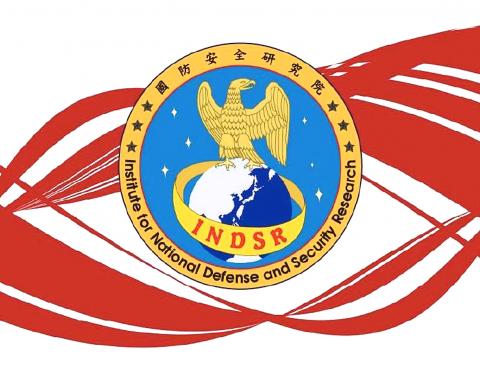China is using local “agents” and intermediary organizations as a front in its cyberwarfare efforts against Taiwan, the Institute for National Defense and Security Research said in an article.
The report, carried by the Ministry of National Defense-affiliated think tank’s monthly gazette and authored by assistant researcher Wu Chun-te (吳俊德), compared Russia’s and China’s cyberwarfare tactics.
As opposed to Russia, which has spent an inordinate amount of time and resources to regain the US’ trust, China has no such problems and can utilize contacts cultivated by its long-running “united front” rhetoric and infiltration efforts, Wu said.

Photo: Tu Chu-min, Taipei Times
Such efforts, aimed at Taiwanese temple organizations, communities and borough and village wardens, have turned them into “Chinese agents” or intermediaries, Wu said.
Having no language barrier in Taiwan, Beijing sends “fake news” to its intermediaries, who then circulate the information on social networks, such as Facebook and the Line messaging app, he added.
These efforts come in addition to buying Taiwanese-run Facebook pages and hiring local Internet celebrities to launch disinformation campaigns, he said.
Separately, National Taiwan University Department of Criminology assistant professor Shen Pao-yang (沈伯陽) said he has discovered that most online information management companies that run social media accounts are receiving “layered” subcontracts from China.
Most of the orders are subcontracts of subcontracts going up three or four layers and it is difficult to find the source without inquiries, Shen said.
However, most companies make private inquiries, as the intermediaries usually know whether the order came from Chinese sources, Shen added.
The companies are small, usually employing up to six people who work at the firms in addition to their regular jobs, Shen said.
Each firm handles many online fan pages and posts information gleaned from content farms or other fan pages, he said, adding that these groups are most prone to spreading “fake news.”
An analysis has found that the companies are mostly indirectly hired by the Chinese United Front Work Department and, occasionally, China’s Taiwan Affairs Office, Shen said.
There is no definitive proof that the Chinese People’s Liberation Army (PLA) is involved, Shen said.
The Mainland Affairs Council yesterday reiterated that any contact with the Chinese Communist Party, the Chinese government, the PLA, private Chinese organizations or individuals regarding political affairs contravenes the Act Governing Relations Between the People of the Taiwan Area and the Mainland Area (台灣地區與大陸地區人民關係條例).
Offenders could be fined NT$100,000 to NT$500,000 and they could be fined repeatedly, the council said.

Right-wing political scientist Laura Fernandez on Sunday won Costa Rica’s presidential election by a landslide, after promising to crack down on rising violence linked to the cocaine trade. Fernandez’s nearest rival, economist Alvaro Ramos, conceded defeat as results showed the ruling party far exceeding the threshold of 40 percent needed to avoid a runoff. With 94 percent of polling stations counted, the political heir of outgoing Costa Rican President Rodrigo Chaves had captured 48.3 percent of the vote compared with Ramos’ 33.4 percent, the Supreme Electoral Tribunal said. As soon as the first results were announced, members of Fernandez’s Sovereign People’s Party

MORE RESPONSIBILITY: Draftees would be expected to fight alongside professional soldiers, likely requiring the transformation of some training brigades into combat units The armed forces are to start incorporating new conscripts into combined arms brigades this year to enhance combat readiness, the Executive Yuan’s latest policy report said. The new policy would affect Taiwanese men entering the military for their compulsory service, which was extended to one year under reforms by then-president Tsai Ing-wen (蔡英文) in 2022. The conscripts would be trained to operate machine guns, uncrewed aerial vehicles, anti-tank guided missile launchers and Stinger air defense systems, the report said, adding that the basic training would be lengthened to eight weeks. After basic training, conscripts would be sorted into infantry battalions that would take

GROWING AMBITIONS: The scale and tempo of the operations show that the Strait has become the core theater for China to expand its security interests, the report said Chinese military aircraft incursions around Taiwan have surged nearly 15-fold over the past five years, according to a report released yesterday by the Democratic Progressive Party’s (DPP) Department of China Affairs. Sorties in the Taiwan Strait were previously irregular, totaling 380 in 2020, but have since evolved into routine operations, the report showed. “This demonstrates that the Taiwan Strait has become both the starting point and testing ground for Beijing’s expansionist ambitions,” it said. Driven by military expansionism, China is systematically pursuing actions aimed at altering the regional “status quo,” the department said, adding that Taiwan represents the most critical link in China’s

EMERGING FIELDS: The Chinese president said that the two countries would explore cooperation in green technology, the digital economy and artificial intelligence Chinese President Xi Jinping (習近平) yesterday called for an “equal and orderly multipolar world” in the face of “unilateral bullying,” in an apparent jab at the US. Xi was speaking during talks in Beijing with Uruguayan President Yamandu Orsi, the first South American leader to visit China since US special forces captured then-Venezuelan president Nicolas Maduro last month — an operation that Beijing condemned as a violation of sovereignty. Orsi follows a slew of leaders to have visited China seeking to boost ties with the world’s second-largest economy to hedge against US President Donald Trump’s increasingly unpredictable administration. “The international situation is fraught